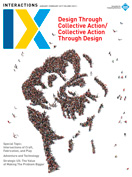Authors:
Michael Cowling, Theresa Tanenbaum, James Birt, Karen Tanenbaum
There are two competing narratives for the future of computationally augmented spaces. On the one hand, we have the Internet of Things [1], where the narrative is one of making our environments more aware of us and of themselves, and generally making everything "smarter" through embedded computation, sensing, and actuation. On the other hand, we have current approaches to augmented or mixed reality, in which the space remains unchanged and instead we hack our perception of the space by superimposing a layer of media between us and the world [2,3]. In this article we present examples of three projects…
You must be a member of SIGCHI, a subscriber to ACM's Digital Library, or an interactions subscriber to read the full text of this article.
GET ACCESS
Join ACM SIGCHIIn addition to all of the professional benefits of being a SIGCHI member, members get full access to interactions online content and receive the print version of the magazine bimonthly.
Subscribe to the ACM Digital Library
Get access to all interactions content online and the entire archive of ACM publications dating back to 1954. (Please check with your institution to see if it already has a subscription.)
Subscribe to interactions
Get full access to interactions online content and receive the print version of the magazine bimonthly.






